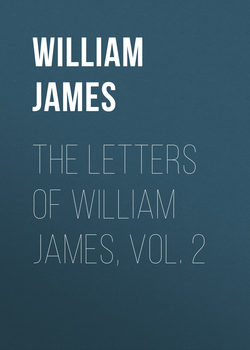Читать книгу The Letters of William James, Vol. 2 - William James - Страница 15
XI
To Henry James
Оглавление[CAMBRIDGE] Apr. 17, 1896.
Dear H.,—Too busy to live almost, lectures and laboratory, dentists and dinner-parties, so that I am much played out, but get off today for eight days' vacation via New Haven, where I deliver an "address" tonight, to the Yale Philosophy Club. I shall make it the title of a small volume of collected things called "The Will to Believe, and Other Essays in Popular Philosophy," and then I think write no more addresses, of which the form takes it out of one unduly. If I do anything more, it will be a book on general Philosophy. I have been having a bad conscience about not writing to you, when your letter of the 7th came yesterday expressing a bad conscience of your own. You certainly do your duty best. I am glad to think of you in the country and hope it will succeed with you and make you thrive. I look forward with much excitement to the fruit of all this work.... Just a word of good-will and good wish. I think I shall go to the Hot Springs of Virginia for next week. The spring has burst upon us, hot and droughtily, after a glorious burly winter-playing March. Yours ever,
W. J.
The next letter begins by acknowledging one which had alluded to the death of a Cambridge gentleman who had been run over in the street, almost under William James's eyes. Henry James had closed his allusion by exclaiming, "What melancholy, what terrible duties vous incombent when your neighbours are destroyed. And telling that poor man's wife!—Life is heroic—however we 'fix' it! Even as I write these words the St. Louis horror bursts in upon me in the evening paper. Inconceivable—I can't try; and I won't. Strange how practically all one's sense of news from the U. S. here is huge Horrors and Catastrophes. It's a terrible country not to live in." He would have exclaimed even more if he had witnessed the mescal experiment, that is briefly mentioned in the letter that follows. He might then have gone on to remark that the "fixing" of life seemed, in William's neighborhood, to be quite gratuitously heroic. William James and his wife and the youngest child were alone in the Chocorua cottage for a few days, picnicking by themselves without any servant. They had no horse; at that season of the year hours often went by without any one passing the house; there was no telephone, no neighbor within a mile, no good doctor within eighteen miles. It was quite characteristic of James that he should think such conditions ideal for testing an unknown drug on himself. There would be no interruptions. He had no fear. He was impatient to satisfy his curiosity about the promised hallucinations of color. But the effects of one dose were, for a while, much more alarming than his letter would give one to understand.
